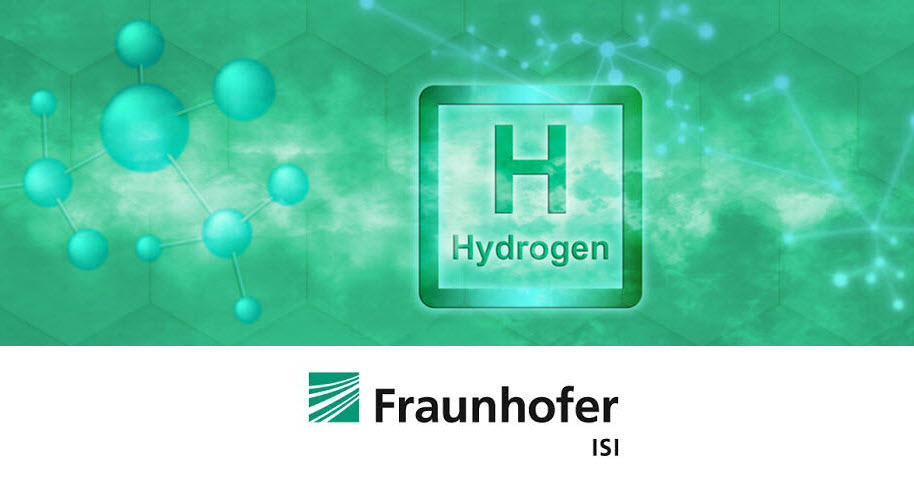
In the national and European hydrogen strategy, green hydrogen and its synthesis products are seen as important building blocks of the energy and climate change.
Import plays an important role in this, but it depends on numerous factors, some of which are currently still unclear. With a new Policy Brief, the Fraunhofer ISI is shedding light on all questions related to the import of green hydrogen and assessing which tasks and challenges still need to be solved.
The climate neutrality, to which Germany and the EU have committed, requires a complete abandonment of fossil fuels by 2050. Substitution through the direct use of renewable energies has so far not been possible in all areas – for example in aviation and shipping or basic chemistry – due to the high energy densities required or in terms of process technology. This is where green hydrogen or green synthesis products such as methanol, methane or ammonia come into play.
As there is not enough cheap renewable electricity available for green hydrogen production in Germany and the EU, the import of sustainably produced green hydrogen and synthetic products is currently being discussed. Countries with favorable climatic conditions could manufacture these products inexpensively on the basis of renewable electricity production and export them to Germany or other countries. Germany would thus remain a large energy importer in the future, which has far-reaching consequences that should be reflected on at an early stage.
New policy brief on hydrogen imports
Against this background, the Fraunhofer ISI publishes the new Policy Brief “Opportunities and challenges in the import of green hydrogen and synthetic products”. Its aim is to look clearly beyond the previously discussed techno-economic questions of future hydrogen imports and to discuss the topic from all possible perspectives. The topics of climate neutrality and sustainability, the technical and economic potential, but also the availability of capital, governance and local effects are dealt with.
The Policy Brief highlights that green hydrogen can be used as a material in steel production, in refinery processes, in basic chemistry or energetically for process heat generation in various industrial applications such as the glass or paper industry, in order to produce CO 2 -neutral production. The use of hydrogen is currently more difficult in applications with high energy densities, such as in international air or sea transport. Here one is dependent on synthesis products of hydrogen to reduce greenhouse gases. However, further conversion steps and CO 2 are required for this and the applications are dependent on combustion processes, which leads to further losses in efficiency and costs.
Cornerstones of a future market
In addition to questions about greenhouse gas reduction, the Policy Brief also outlines the cornerstones of a future market for hydrogen imports in Germany and Europe, which should be between 100 and 700 billion euros per year. The range is due to the fact that there is still uncertainty regarding the possible areas of application of hydrogen and the energy carriers derived from it. However, an import is considered necessary because the potential for renewable energies in Germany and the EU, due to their availability, economic efficiency and acceptance, is very likely not sufficient to meet future hydrogen demand cost-effectively.
In addition to many potentials, the hydrogen import also brings challenges. The first thing to do is to build up appropriate production and transport capacities, which are time-consuming and capital-intensive. In order to keep possible new import risks low, long-term partnerships with democratically, politically and economically stable production countries should be established. It is also important to develop and apply sustainability criteria so that these countries can achieve their own energy and climate policy goals. Measures such as investment promotion instruments or secure hydrogen demand can help to create attractive market conditions for hydrogen production and transport for the exporting countries.
It is particularly important to integrate the hydrogen economy into the general governance of the transformation of the energy system. This results in a hierarchical »Energy Efficiency First« principle, which gives priority to reducing energy demand, decarbonising the electricity sector with renewables and using them directly over the development of the hydrogen economy. The effects of the conversion losses during hydrogen production can thus be limited.
Questions of technology sovereignty in hydrogen technologies
From the perspective of the importing countries, the Policy Brief also addresses and evaluates questions of technology sovereignty in hydrogen technologies. For Germany and Europe, there seems to be a threat to the reliability of the exporting countries of green hydrogen rather than to access to existing technologies. Conversely, from the point of view of many exporting countries, both the available technological knowledge and the manufacturers of the technologies are located abroad, which is why the concept of technology sovereignty needs to be expanded to include the perspective of developing countries.
Prof. Dr. Martin Wietschel, who heads the Competence Center Energy Technologies and Energy Systems at Fraunhofer ISI and coordinates all research work on the subject of hydrogen, concludes: “The complexity of the import of green hydrogen is currently not understood enough and the challenges and future challenges are still increasing solving tasks are therefore sometimes underestimated. Therefore, a possible hydrogen import and its consequences should be comprehensively analyzed, to which our Policy Brief aims to make a contribution. ”
The Fraunhofer Institute for Systems and Innovation Research ISI analyzes the development and effects of innovations. We research the short- and long-term developments of innovation processes and the social effects of new technologies and services. On this basis, we provide our clients from business, politics and science with recommendations for action and perspectives for important decisions. Our expertise lies in sound scientific competence and an interdisciplinary and systemic research approach.
More information
Source: Fraunhofer ISI
Read the most up to date Fuel Cell and Hydrogen Industry news at FuelCellsWorks




